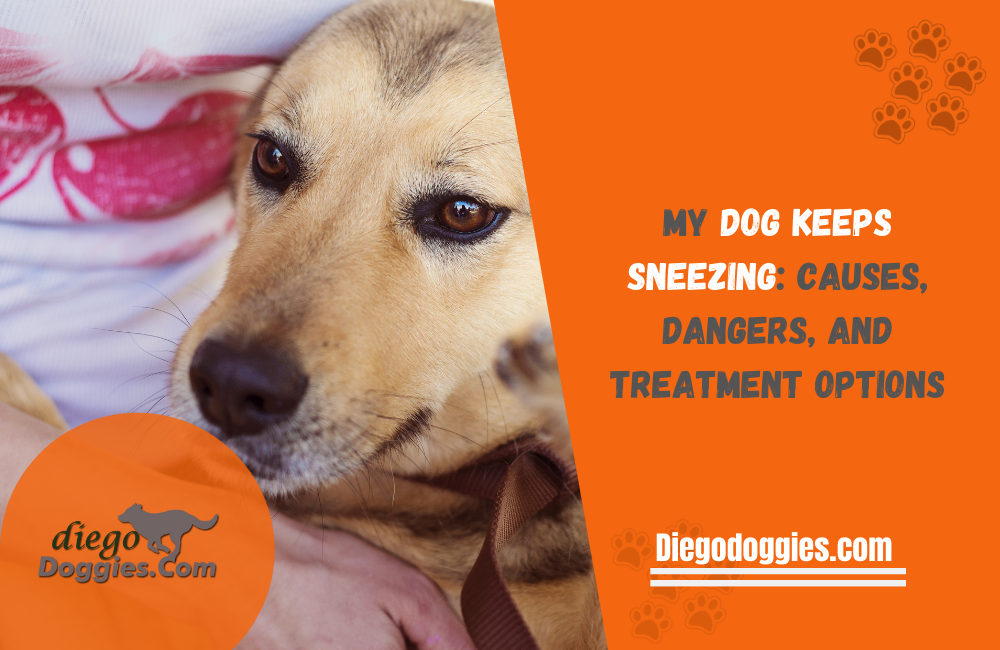Dogs sneeze for many reasons: from allergies to a foreign object in their nose, to a respiratory infection. If your dog keeps sneezing and you are not sure why it is important to take him to the veterinarian for an examination. In this blog post, we will discuss the causes of dog sneezing, the dangers of prolonged sneezing in dogs, and the treatment options available.
Why Do Dogs Sneeze?
One of the most common questions a veterinarian receives is “Why does my dog keep sneezing?” While our first instinct may be to chalk it up to allergies or a cold, there are many different reasons why your furry friend might be sneezing.
In this blog post, we will discuss some of the most common causes of sneezing in dogs, when you should be concerned, and what you can do to help your dog feel better.
Sneezing is a reflexive action that helps clear the nasal passages of irritants. In dogs, sneezing is often caused by environmental allergies (to things like pollen, dust mites, or mold), bacterial or viral infections (such as the infectious tracheobronchitis or “kennel cough”), foreign bodies in the nose (such as grass seeds), or even tumors.
While sneezing itself is not usually dangerous, it can be a sign of a more serious problem if it is accompanied by other symptoms like fever, lethargy, nasal discharge, or difficulty breathing. If your dog is showing any of these additional signs, it is important to contact your veterinarian right away.
What Are The Dangers Of Prolonged Sneezing In Dogs?
Prolonged sneezing in dogs can be dangerous if it is accompanied by other symptoms like fever, lethargy, nasal discharge, or difficulty breathing. If your dog is showing any of these additional signs, it is important to contact your veterinarian right away. In some cases, prolonged sneezing can be a sign of a more serious problem like a viral infection, bacterial infection, or even a tumor.
If you are concerned about your dog’s sneezing, it is always best to consult with your vet. They will be able to help you determine the cause of the sneezing and provide treatment options. Treatment for prolonged sneezing will vary depending on the underlying cause but may include antibiotics, antihistamines, or steroids. Surgery may also be necessary in some cases to remove a foreign body or tumor.
What Are Common Allergies That Could Make A Dog Sneeze?
There are many different things that can cause allergies in dogs, including pollen, dust mites, mold, and certain foods. If your dog is sneezing and you suspect it may have an allergy, it is important to consult with your veterinarian. They will be able to help you identify the allergen and provide treatment options.
Treatment for allergies will vary depending on the severity of the reaction but may include antihistamines, steroids, or immunotherapy. In some cases, avoidance of the allergen is the only way to prevent an allergic reaction.
What Are Some Common Allergies That Could Make A Dog Sneeze And That Owners Should Be Aware Of?
Some common allergies that could make a dog sneeze include pollen, dust mites, mold, and certain foods. If your dog is sneezing and you suspect it may have an allergy, it is important to consult with your veterinarian.
They will be able to help you identify the allergen and provide treatment options. Treatment for allergies will vary depending on the severity of the reaction but may include antihistamines, steroids, or immunotherapy. In some cases, avoidance of the allergen is the only way to prevent an allergic reaction. Common allergens are discussed in more detail below.
1. Pollen Allergies
Pollen is a common allergen that can cause sneezing and other allergic reactions in dogs. Pollen is a powdery substance released by plants during reproduction. It is transported by the wind and can be found in the air, on clothing, and in the environment.
Dogs with pollen allergies may experience symptoms like sneezing, watery eyes, runny nose, coughing, and difficulty breathing. Treatment for pollen allergies will vary depending on the severity of the reaction but may include antihistamines, steroids, or immunotherapy. Avoidance of pollen is often the best way to prevent an allergic reaction.
2. Dust Mite Allergies
Dust mite allergies are a common cause of dog sneezing, and they can be tough to manage. If your dog is sneezing a lot and you think it may be due to an allergy, the best thing to do is take him to the veterinarian.
They will be able to give your dog a thorough examination and help you determine the cause of the sneezing. Dust mite allergies are unfortunately common in dogs, and they can be difficult to control.
If your dog has dust mite allergies, the best thing you can do is collaborate with your veterinarian to find a treatment that works for him. There are many different options available, and your vet will help you find the best one for your dog. Dust mite allergies can be a nuisance, but with the help of your vet, you can keep your dog comfortable and sneeze-free.
3. Mold
Mold allergies are one of the most common causes of sneezing in dogs, and they can be a real nuisance for both dog and owner. Mold spores are found in the air, and when they are inhaled, they can cause an allergic reaction.
Symptoms include sneezing, runny nose, itchy eyes, and coughing. If your dog is showing any of these symptoms, it is important to take him to the veterinarian for an examination.
Mold allergies can be difficult to diagnose, but veterinarians have a variety of tools at their disposal to find the cause of your dog’s sneezing. Once the allergy has been diagnosed, there are several treatment options available. Dog owners should collaborate with their veterinarians to find the best course of treatment for their pets.
4. Dander
Dander allergies are a common cause of sneezing in dogs. When these proteins are inhaled, they can cause an allergic reaction. Symptoms of a dander allergy include sneezing, wheezing, and difficulty breathing.
If your dog is showing these signs, it is important to take him to the veterinarian for an examination. Dander allergies are often treated with antihistamines or steroids. In severe cases, allergy shots may be necessary.
If you think your dog may be allergic to dander, talk to your veterinarian about testing and treatment options.
What Are Some Dangers Of Prolonged Sneezing In Dogs That Owners Should Be Aware Of?
Prolonged sneezing can be a sign of a more serious problem like a viral infection, bacterial infection, or even a nasal tumor. If you are concerned about your dog’s sneezing, it is always best to consult with your vet. They will be able to help you determine the cause of the sneezing and provide treatment options.
Dangers of Prolonged Sneezing
Prolonged sneezing can be a sign of a more serious problem like a viral infection, bacterial infection, or even a nasal tumor.
If you are concerned about your dog’s sneezing, it is always best to consult with your vet. They will be able to help you determine the cause of the sneezing and provide treatment options.
Treatment for prolonged sneezing will vary depending on the underlying cause but may include antibiotics, antihistamines, or steroids. Surgery may also be necessary in some cases to remove a foreign body or nasal tumor.
Can Humans Catch Diseases From Dogs?
There are a few diseases that can be passed from dogs to humans, but these are rare. The most common disease that is passed from dogs to humans is rabies. Rabies is a viral infection that affects the nervous system and is fatal if left untreated. Other less common diseases are as follows:
Brucellosis- a bacterial infection that can cause serious illness in humans – see reference below.
Campylobacteriosis- a bacterial infection that causes diarrhea in humans
Cryptosporidiosis- a parasitic infection that causes diarrhea in humans
Giardiasis- a parasitic infection that causes diarrhea in humans
If you are concerned about contracting a disease from your dog, it is important to consult with your veterinarian. They will be able to provide you with more information and help you take the necessary precautions to protect yourself and your family. Vaccinations are also available for some of these diseases.
Conclusion
If you suspect that your dog may be allergic to dander or any of the other allergens, it is important to take him to the veterinarian for an examination. In many cases, the veterinarian will be able to identify the allergy based on the symptoms and may recommend treatment options such as antihistamines or immunotherapy. With proper care and treatment, most dogs with allergies can live happy and healthy lives.
Related Content
- Alga Norte Dog Park with Training Obstacles & Nice Off-Leash Areas
- Coronado Dog Beach near San Diego Offers Great Point Loma Views
- Del Mar Dog Beach with Spectacular Cliff Views
- Dusty Rhodes Dog Park in San Diego near Ocean Beach
- Fiesta Island Dog Beach Off-Leash Dog Park at Mission Bay
- Grape Street Dog Park in Balboa Park Brings Nature to the City
- Morley Field Off-Leash Dog Park in Balboa Park – Amazing Canyon Views
- Nate’s Point Off-Leash Dog Park at Balboa Park
- Ocean Beach Off-Leash Dog Beach in San Diego, CA
- Rancho Bernardo Off-Leash Dog Park in San Diego, CA
- Dog Grooming – Tips And Tools
- How To Clean A Dog’s Clothes, Sweaters, Bedding & Collars
- 10 Best Park Accessories for Dog Owners
- Is Your Dog Barking Excessively And Annoying Your Neighbours?
- Dog Grooming Take- Diego Doggies
- Restrain a Dog for Grooming: The Safe and Easy Way
- Start a Dog Grooming Business
- Adopt a Dog in San Diego: Everything You Need to Know
- Dog Training Cost? A Comprehensive Guide
- Right Dog Raincoat: The Ultimate Guide
- San Diego Dog Park Safety Tips, Training, and Dog Accessories
- What You Should Do To Become a Responsible Dog Owner
- 7 Benefits of Dog Grooming and Exercising in San Diego


3 thoughts on “My Dog Keeps Sneezing: Causes, Dangers, and Treatment Options”